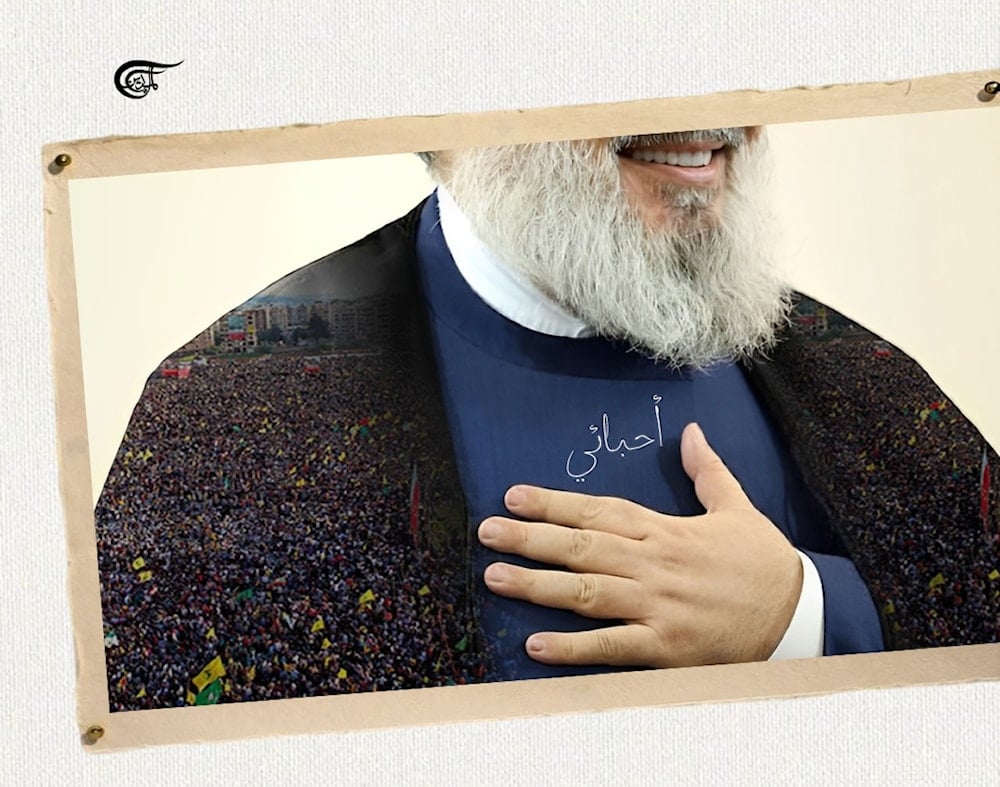Nasrallah: The loss and the promise
Despite all the setbacks, commitment to the resistance to Imperialism and Zionism and to the victory of independent peoples of the region remains a living cause, for all decent people.
-

In 2024, a hard rain stole our beating heart, but we still live. (Al Mayadeen English; Illustrated by Batoul Chamas)
Many still find it hard to believe that our brilliant pole star could have been brought down by criminals with so little talent, just the persistence to pound an entire city with a series of massive bombs provided by sponsors on the other side of the world.
The loss of Sayyed Hassan Nasrallah is still being felt by the people of Lebanon and by all decent people around the world. In Yemen, Nasrallah’s portrait lines the streets of all the major cities, not under foreign occupation, and takes pride of place at Yemeni memorials for their own great martyrs.
Rarely has the world seen a great spiritual leader who was also a leading political analyst and commander in chief of a powerful army. Nasrallah was a moral teacher, an encouraging mentor, and a unique presence. His influence on millions is more than a legend, he created and became, in the words of one Arab leader, “a path” which many will continue to walk.
Without breaking the ‘confessional’ Lebanese system, Sayyed Hassan created a resistance network which came to include the majority of Lebanese people and a reference point for the regional alliance of independent peoples. That alliance crossed sects and religions. His words too were placed in song.
Israelis waited on his speeches, words which were banned in many Western countries but required reading inside the Israeli colony. Indeed, the attempts in many countries to ban his words and his image are testament to his moral power and standing. Hassan Nasrallah joins his colleague, the great Iranian resistance leader Qassem Soleimani, as someone regarded as “dangerous” to colonial cultures, even after his death.
For those reasons, those of us who seek to preserve his legacy have to choose carefully where to post them. We know that many of the North American and European media platforms will delete and discipline those who dare to share his dangerous words.
Nevertheless, those who hunt down those words will find their enduring relevance. For example, Nasrallah always saw the North American hand behind the Zionist enemy. He was a myth breaker, saying:
“According to some theories, Israel controls [North] America. No sir. It is America that controls Israel. The story about the Jewish and Zionist lobby is … a joke invented by the Arabs so they do not have to fight Israel. They do this so they can go to America, deposit their money there, and establish relations with America under the pretext that they are creating an Arab lobby in order to compete with the Jewish lobby. After 75 years we can see what came out of the Arab lobby. The Arab money is piling up in the American coffers but that’s it.”
The Sayyed’s oratory began with religious invocations but continued with humanist themes which can easily be appreciated across cultures. That is why his audience was so wide and deep. The North American Jewish academic Norman Finkelstein said of Nasrallah, “Nasrallah is the only political leader in the world from whom you learn in his speeches”. He was indeed a great teacher. Finkelstein posted several of Nasrallah’s full speeches on his own website.
Sayyed Hassan’s support for Gaza cost him and hundreds of his followers their precious lives, but they knew this was the price of struggle. Their aim in pummeling the enemy military in the north of occupied Palestine was to draw fire away from Gaza. That did take some pressure off Gaza, stretching enemy ranks. Hezbollah actions were always linked to moral imperatives. They called each selfless sacrifice “a martyr on the road to al-Quds [Jerusalem]”.
That sacrifice resonated across the region as well as in Lebanon, where Nasrallah’s words to his fighters opposing the "Israel" invasion of 2006 were immortalised in the song Ahibba'i (My Dear Ones) by the Christian singer Julia Boutros. The song is well known and repeated by huge, largely Christian audiences at most of her concerts. She donated the profits from the sales of the song to help the families of Hezbollah fighters and the Lebanese killed while defeating that invasion.
Here are some of the original words:
“I received your message and heard your words ... you are the true promise of the victory that will come, God willing. You are the freedom of the detainees, liberation for the land and protection for the homeland, for honor and for faith. My brothers, you are the essence of the history of this nation and the epitome of its spirit ... its culture, values, love and gratitude, you are the epitome of its manhood, the eternity of the cedar in our mountain peaks, and the humility of the ears of wheat ... lofty like the majestic mountains of Lebanon, towering over the mighty .. after God Almighty you are the hope and our promise is on you, you were and still are and will remain the hope and the promise, I kiss your heads that have raised high every head”.
The Iranian commander Qassem Soleimani said, “I didn’t see anyone listening to this letter and not cry.” That emotional connection to Sayyed Hassan remains widespread, due to his faith, his Islamic and humanist values, and the consistency of his words and actions.
In 2024, a hard rain stole our beating heart, but we still live.
We cannot imagine that his life’s work ends with his death. Despite all the setbacks, commitment to the resistance to Imperialism and Zionism and to the victory of independent peoples of the region remains a living cause, for all decent people.

 Tim Anderson
Tim Anderson
 6 Min Read
6 Min Read











